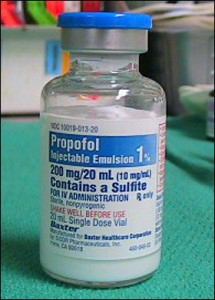Propofol Use
Propofol Use
Propofol also known as Diprivan is a short-acting intravenous drug that is used for general anesthesia. The use of propofol is most commonly seen in the sedation of mechanically ventilated adults and sedation during surgery. Propofol use is also common in veterinary medicine. Propofol use is approved in more than 50 countries.
Propofol is not a barbiturate nor is it an opioid. Propofol has actually been used to replace Pentothal or sodium thiopental for inducing anesthesia because it works more rapidly and clearly than thiopental. Propofol is also referred to as “milk of amnesia” which is a play on the words “milk of magnesia” because it has a milky white consistency when it is prepared for intravenous use.
While propofol use is common when used in general anesthesia it has also become more common for recreational purposes. Propofol can be self-administered for short-term effects such as mild euphoria, hallucinations, and lack of inhibition. Long term propofol use can lead to addiction. Recreational propofol use is most commonly found among medical staff such as anesthesiologists who have access to it. Because of the rotations of their shifts with sort periods of rest, recreational use of propofol allows the user to go into a well-rested state and quickly come out of it.
Recreational propofol use among those not in the medical community is fairly rare because of its potency and its level of monitoring. Propofol use is not scheduled by the US DEA. There is a wide range of different reactions to the drug propofol so the potential misuse of it can be common and at least three deaths from self-administration have been recorded from propofol use.
Propofol use made its debut with media with the death of Michael Jackson. It wasn’t just propofol that made its debut but the risks associated with it. Some of the risks associated with propofol use aside from low blood pressure are apnea and pain in the injection site. Not only that but propofol use has strong adverse side effects when mixed with benzodiazepines which is the concoction the coroner said killed Michael Jackson. The other risk associated with propofol being used in anyway is the way it affects all people so differently. A person could have no reaction to a large dose of propofol and another person could have a profound reaction a small dose of propofol. This can make propofol hard to administer even in a medical setting. Another recent but rare side effect of propofol use is propofol infusion syndrome. Propofol infusion syndrome is potentially lethal and has been reported in critically ill patients after they have used high-doses of it in combination with corticosteroids and catecholamines.
Propofol use is not similar to heroin use or cocaine use but it definitely has made its name in the headlines more than once. Propofol use would probably be more common recreationally if it was more available to the general public but seeing how it is mainly used for general anesthesia you can’t get it in a prescription at home.
